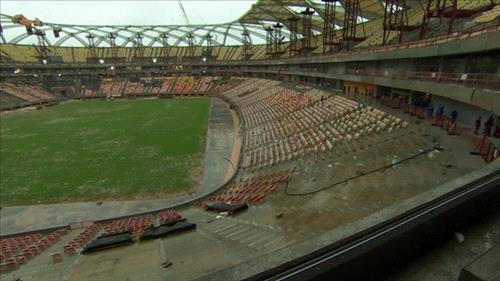Ammon News - After a spate of building problems and public protests in Brazil, the governing body of world football, Fifa, repeatedly warned there would be "no compromise" over the delivery of World Cup stadiums.
But with Fifa's end-of-year deadline looming, several stadiums are well behind schedule and one host city, Cuiaba, has told the BBC that not only will be it unable to finish its stadium on time, but there are not even enough hotel rooms for visiting fans.
Even though Fifa only insisted on a minimum of eight stadiums to host the World Cup, Brazil decided to go with 12, such was the interest and demand from all parts of this huge nation to be a part of the tournament.
But, in hindsight, has Brazil bitten off more than it can chew?
Up in the northern city of Manaus, they are finishing an arena that bears some resemblance to the famous Bird's Nest Stadium in Beijing: an elaborate steel structure, imported from Portugal, envelops the playing area like an indigenous woven basket.
But the project, which is being built with $300m (£186m) of public money, is way behind schedule.
Fifa's strict end-of-year deadline for all stadiums to be ready is almost upon us, and in Manaus they are up against the clock - struggling with the hot, tropical weather and a complex design.
Even though the local team, Nacional, rarely attracts more than 3,000 fans, officials say the expense is justified and the stadium will have a purpose after the World Cup.
As the intense tropical rain kept many of his men from their tasks, Miguel Capobianco said teams were working 24 hours a day.
Even though many of the roof supports have yet to be replaced and half the seats have been installed, the stadium co-ordinator was confident it would eventually be seen as a worthwhile venture.
"The opportunity that the World Cup brings us is the motivation, more momentum to make more investments," Mr Capobianco said as we sheltered from the rain under a portion of the transparent new roof that was already finished.
"The World Cup will really help to accelerate the economic development of the city and the region," he added.
No seats, no roof
If they seemed confident of just about making it in Manaus, more than 1,000 miles to the south in Cuiaba, the situation is much more critical.
*BBC
